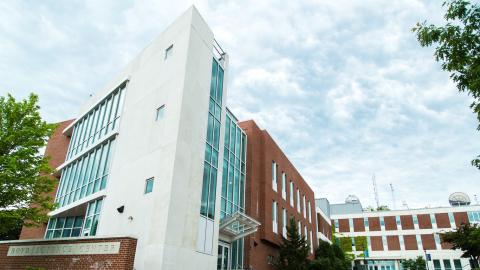Explore the science of life from minute strands of DNA to complex ecosystems that stretch for miles and miles.
Our program offers opportunities for research and study using the latest technology and equipment, in the lab or in the field. In faraway tropical rainforests and coral reef habitats or New Hampshire’s own lakes and forests, PSU students work hands-on with faculty members to answer some of life’s toughest questions.
Degree
The B.S. in Cell and Molecular Biology is the newest biology degree program at Plymouth State. Our Cell and Molecular Biology prepares students for graduate school, health professions, or careers in biotechnology and the pharmaceutical industry. Laboratory experiences applicable to your career begin in the first year and include opportunities for students to conduct original research working closely with a faculty mentor. Our summer research program in collaboration with the NH-INBRE program gives students a chance to work as full-time researchers. This degree is also designed to prepare students for professional schools including medical, dental, and veterinary schools.
Plymouth State University also offers B.S. in Biology, B.S. in Environmental Biology, B.A. in Biology, and the Biology Honors programs. Click the links in the degree names to find out more.
Careers
Opportunities for careers in healthcare and biotechnology are areas of active growth, particularly in the Northeast. Students with a B.S. in Cell and Molecular Biology are qualified for careers with companies such as Bristol Meyers Squibb, Lonza, Mascoma, Boston Analytical, and many others. The degree is also a pathway to pursue further education to become a nurse practitioner, physician’s assistant, nurse, dentist, veterinarian, pharmacist or other areas of healthcare. Graduates are also qualified to pursue a Masters in Biology at Plymouth State and other schools or a PhD in Biology or a related field.
Please scroll down to see more about the curriculum, requirements, program details, and career paths.
The BS in Cell and Molecular Biology prepares students for graduate studies or work in biomedical fields. Laboratory experiences include opportunities for students to conduct original research working closely with a faculty mentor. This degree is also appropriate for professional schools including medical, dental, and veterinary schools. Note that some professional/graduate schools require a full year of physics. Students should work closely with their academic advisor to plan their coursework.
Curriculum & Requirements
| Course | Title | Credits |
|---|---|---|
| Major Requirements | ||
| BI 1110 | Biological Science I (TECO) | 4 |
| BI 1120 | Biological Science II | 4 |
| BI 2270 | Integrative Biology (WECO) | 4 |
| BI 3040 | Microbiology | 4 |
| BI 3060 | Genetics | 4 |
| BI 3130 | Evolution | 4 |
| BI 3240 | Conservation (DICO,GACO) (Remove INCO/INCP) | 3 |
| BI 4120 | Cell Biology | 4 |
| BI 4188 | Molecular Biology | 4 |
| BI 4980 | Biology Seminar | 2 |
| CH 1050 | Laboratory Safety | 1 |
| CH 2335 | General Chemistry I (QRCO) | 4 |
| CH 2340 | General Chemistry II | 4 |
| CH 3370 | Organic Chemistry I | 4 |
| CH 3380 | Organic Chemistry II | 4 |
| 2000 Level BI Electives | ||
| Complete 4 credits of 2000-level or above (cannot be BIDI) | 4 | |
| Upper Level Cell and Molecular Biology Electives | ||
| Complete two courses from the following: 1 | 8 | |
BI 3035 | Biochemistry I (INCO) | |
or CH 3030 | Biochemistry I | |
BI 4150 | Developmental Biology (WRCO) | |
BI 4770 | Animal Physiology (WRCO) | |
BI 4780 | Neurobiology (WRCO) | |
BI 4950 | Undergraduate Research | |
| Physics | ||
| PH 2110 | College Physics I | 4 |
| or PH 2510 | University Physics I | |
| Mathematics Foundations | ||
| MA 1800 | College Algebra (or equivalent Math Placement Score) 2 | 0-3 |
| MA 2550 | Calculus I (QRCO) | 3-4 |
| or MA 2300 | Statistics I (QRCO) | |
| General Education | ||
| EN 1400 | Composition | 4 |
| IS 1115 | Tackling a Wicked Problem | 4 |
| CTDI | Creative Thought Direction | 3-4 |
| PPDI | Past and Present Direction | 3-4 |
| SSDI | Self and Society Direction | 3-4 |
| Directions (choose from CTDI, PPDI, SSDI) 3 | 4-8 | |
| INCP | 4 | |
| Electives | 15-19 | |
| Total Credits | 120 | |
- 1
One course must be a Writing in the Discipline Connection (WRCO) (Developmental Biology (BI 4150), Animal Physiology (BI 4770), or Neurobiology (BI 4780))
- 2
Math Placement Score can substitute such that only Calculus I or Statistics is required.
- 3
Directions should total 16 credits because SIDI is waived for BS Cell and Molecular Biology.
Check all course descriptions for prerequisites before planning course schedule. Course sequence is suggested but not required.
To complete the bachelor’s degree in 4 years, you must successfully complete a minimum of 15 credits each semester or have a plan to make up credits over the course of the 4 years. For example, if you take 14 credits one semester, you need to take 16 credits in another semester. Credits completed must count toward your program requirements (major, option, minor, certificate, general education or free electives).
| Year One | Credits | |
|---|---|---|
| BI 1110 | Biological Science I (TECO) | 4 |
| BI 1120 | Biological Science II | 4 |
| EN 1400 | Composition | 4 |
| IS 1115 | Tackling a Wicked Problem | 4 |
| Mathematics Foundations Course: | ||
| MA 1800 | College Algebra | 0-3 |
| MA 2550 or MA 2300 |
Calculus I (QRCO) or Statistics I (QRCO) |
4 |
| Directions (choose from CTDI, PPDI, SSDI) 2 | 3-4 | |
| Elective | 4 | |
| Credits | 27-31 | |
| Year Two | ||
| BI 2270 | Integrative Biology (WECO) | 4 |
| CH 2335 | General Chemistry I (QRCO) | 4 |
| CH 2340 | General Chemistry II | 4 |
| Physics Requirement: | ||
PH 2110 or PH 2510 |
College Physics I or University Physics I |
|
| Complete 4 credits of 2000-level or above (cannot be BIDI) | 4 | |
| Directions (choose from CTDI, PPDI, SSDI) 2 | 6-8 | |
| Electives | 3 | |
| Credits | 25-27 | |
| Year Three | ||
| BI 3040 | Microbiology | 4 |
| BI 3060 | Genetics | 4 |
| BI 3240 | Conservation (DICO,GACO) | 3 |
| CH 3370 | Organic Chemistry I | 4 |
| CH 3380 | Organic Chemistry II | 4 |
| BI Upper Level 3000/4000 Biology elective 3 | 4 | |
| Directions (choose from CTDI, PPDI, SSDI) 4-8 | 3-4 | |
| Electives | 3-4 | |
| Credits | 29-31 | |
| Year Four | ||
| BI 3130 | Evolution | 4 |
| BI 4120 | Cell Biology | 4 |
| BI 4188 | Molecular Biology | 4 |
| BI 4980 | Biology Seminar | 2 |
| BI Upper Level 3000/4000 Biology elective (WRCO) 3 | 4 | |
| INCP | Integrated Capstone | 4 |
| Directions (choose from CTDI, PPDI, SSDI) 4-8 | 0-4 | |
| Electives | 4-9 | |
| Credits | 26-35 | |
| Total Credits | 120 | |
- 1
Math Placement Score can substitute such that only Precalculus or Statistics is required.
- 2
Required to take one each of CTDI, SSDI, and PPDI and then fulfill 16 credits total of Directions courses. SIDI courses are waived and do not count toward Directions course total for Biology majors.
- 3
Pick from BI 3030/CH 3030/ BI 3035/CH 3035 Biochemistry I, BI 4150 Developmental Biology (WRCO), BI 4770 Animal Physiology (WRCO), BI 4780 Neurobiology (WRCO), BI 4950 Undergraduate Research. One course taken must be a WRCO.
- An understanding of the scientific method as the means to increase understanding of the natural world through hypothesis-testing.
- An aptitude for critically reading scientific literature, including primary research journals.
- Proficiency in writing, especially in scientific format.
- An ability to present scientific information orally with emphasis on clear interpretation of scientific data.
- Proficiency in techniques specific to a subdiscipline of biology, including but not limited to laboratory, field, and statistical techniques.
- An understanding of the critical issues facing the environment at local, regional, national, and global scales.
- Biological literacy allowing for the evaluation of new information and emerging issues.
- Readiness for post-graduate experiences in graduate school, professional school, or biology employment.
- Research skills such as data collection, laboratory techniques, and working in teams
- Ability to problem-solve and think critically
- Written and verbal communication skills to convey technical and scientific data to both scientific and non-scientific communities
Explore Program Details
Biology Majors can take up to 1-2 Minors, including those below.
While a biology major is based in the interdisciplinary studies of biology, chemistry, physics, and math there are also opportunities to extend your interest to some of the other 40+ minors that are offered at Plymouth State, including those below. It’s a great time to be a biology major at PSU!
- Adventure Education
- Chemistry
- Computing
- Criminal Justice (especially for those interested in becoming a Fish and Game officer)
- Global Health
- Health
- Neuroscience (especially for those considering Medical School)
- Mathematics
- Psychology
- Sustainability
- Women’s Studies

The heart of scientific research and study at PSU is the Boyd Science Center. The University’s proximity to the lakes, rivers and mountains of New Hampshire gives students access to a unique natural laboratory. Resources at Boyd provide students with a place to explore nature’s questions, generated in the great outdoors or under the microscope.
Resources at Boyd
- Climate-controlled chambers for whole organism research
- Dedicated spaces for student research
- PCR, Rt-PCR, Western blotting, Immunohistochemistry
- Animal behavior lab with advanced video tracking
- BSL-2 Microbiology lab
- Six 300-liter marine aquariums
- Human physiology lab
- Collection of bird specimens
- Dedicated tissue culture facility
- Rooftop greenhouse with computerized temperature controls and separate areas for preparation and growing
- PSH, an herbarium of 20K preserved and mounted specimens
As a cell and molecular biology major you will experience:
- Hands-on experience from molecules and cells to ecosystems
- Degree programs in Biology (B.A. and B.S.) and Environmental Biology
- State-of-the-art laboratory and research facilities, including a 1,400-liter marine aquarium, fully equipped human physiology lab, BSL-2 microbiology and cell biology labs, herbarium and specimen room, and a rooftop greenhouse
- Opportunities for local, national, and international field studies
- Partnerships with New Hampshire Fish and Game, Hubbard Brook Research Forest, NH-INBRE grant to further studies of human health in New Hampshire, and others
- One-on-one advising sessions with a biology faculty member at least once every semester
- A talented and dedicated faculty
Explore Today.
Realize Tomorrow.












